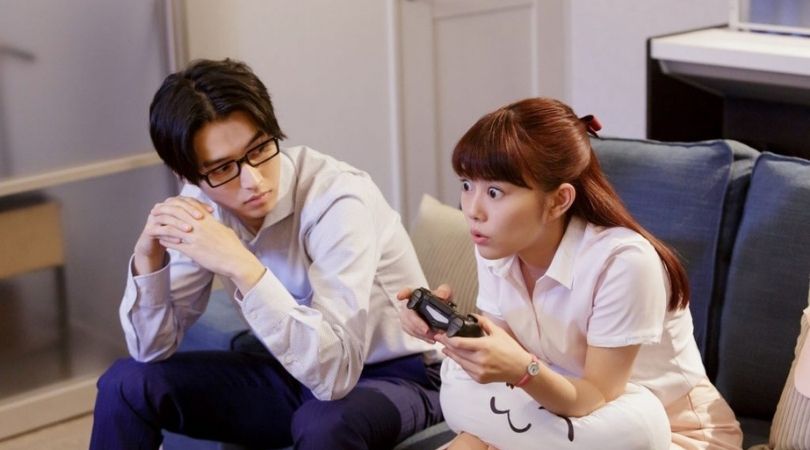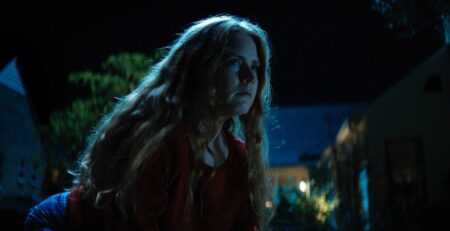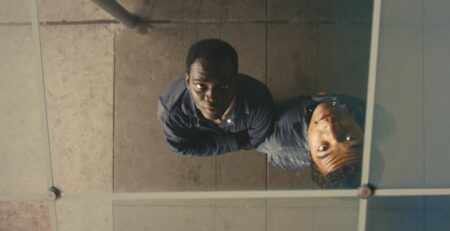
Wotakoi: Love is Hard for Otaku is a near-perfect romance that showcases the reality of dating while being a geek….well at least the anime and manga are. In the live-action film adaptation of the same name, which screened at this year’s virtual Fantasia Fest, the focus on the ways geeks being able to get together by accepting each other’s hobbies and letting them be who they are gets lost in live-action translation. Directed by Yuichi Fukuda, fans of the existing material get to watch Nifuji Hirotaka (Kento Yamazaki) and Narumi Momose’s (Mitsuki Takahata) romance again, while new audiences get the chance to experience them for the first time.
This version of Wotakoi is, first and foremost, a romance and one that thrives on a comedy of errors. In it, Narumi starts a new job and does everything she can to hide the fact she is an otaku after dealing with a break-up because of it. But one of her new colleagues, Nifuji, is a childhood friend who knows all about her passion for BL (called BL by fans), and other anime and manga. The nearly two-hour film focuses on Narumi and Nifuji’s romance, their first dates, and the constant miscommunication between them.
Now, for fans of anime and manga, there is a clear difference in the romance presented here. While the two seamlessly fit together and accept each other’s fandom and are never intimidated by the other’s interests in the source material, in the live-action film, the focus is on Nifuji attempting to squash Narumi’s obsessive otaku talk and eventually forcing himself to like her interests.
This changes the narrative of Wotakoi: Love Is Hard for Otaku in a way that doesn’t show understanding and acceptance the two characters have of each other, even when others don’t. Additionally, the side characters, Hanako Koyanagi (Nanao) and Taro Kabakura (Takumi Saitoh), only show up in the third act and are used in such a way that removes the importance they have to the narrative in the source. Instead, they exist to be potential love interests to the main characters and don’t offer the complementary dynamic of another otaku couple. Having written about how the source material gets everything about being a geek in love right, it’s easy to point out my own biases when watching the film and the substantial deviations it takes from the source material. This film embraces romantic comedy tropes to the point of hindering the story that so many anime fans fell in love with. That said, this doesn’t mean that it’s a bad film, and ultimately, the spirit of the manga is in this live-action.
This is best shown by the casting and attention to costuming that is directly pulled from the pages of the manga. From their work clothes to their date clothes, it all fits. Plus, there is undeniable chemistry between Mitsuki Takahata and Kento Yamazaki as our leads that immediately makes you root for them. Additionally, while this Wotakoi does have its own unique storyline, there are moments adapted straight from the manga that improve on them.
This specifically comes when Narumi, a doujinshi mangaka in her spare time, needs to hit a deadline before a convention. Instead of leaving her to struggle, Nifuji steps in and helps her finish her erotic BL doujinshi (self-published manga) and accompanies her to the convention to help sell copies of the doujinshi at the convention. This scene not only happens as it does in the source but is expanded upon as well. While we don’t see Koyanagi or Kabakura, we do get to see Narumi speaking with her friends about BL, and the conversation is not only relatable as a fan of the genre myself but shows the way Narumi has formed meaningful relationships through her otaku life. This is something we don’t see in the manga or anime, and instead, we only get moments with Hanako that allow Narumi to be open about her racy interests.
But ultimately, this film is focused on Narumi. The story is about what Nifuji can do to win her heart. It’s about how he changes himself. And it’s about how Narumi is clueless to it all. This leaves Nifuji as a mirror for her and not a fully dynamic character in his own right. That said, it must be said that out of all the actors cast in their roles Yamazaki is the one who sells his anime counterpart so seamlessly on screen. While they all hit elements of their characters and are done extremely well, as Nifugi, Yamazaki hits everything from facial expressions and mannerisms to speech and silent charisma. Given his past roles in anime adaptations of Orange and Your Lie in April, it’s no surprise he has the leading shojo man down.
On top of all of this, writer-director Yuichi Fukuda made the strong choice to lean into anime tropes and visual queues as hard as he possibly could, which, given his work on the Gintama and Psychic Kusou live actions, makes sense. This adds whimsy to the slice-of-life film and will make anime fans feel seen. Additionally, the choice to add musical numbers that range from hyperactive J-pop with a cosplay ensemble group dancing behind our main characters to melancholy jazz, the choice to add musical numbers pays off. The musicals are fun and add to the film. That said, the unique spin that Fukuda puts on the Narumi and Nifuji’s story in the musical can’t overcome the attempt at possible love triangles. While things resolve smoothly with an extremely satisfying ending, that one element is something the film could have done without.
Overall, Wotakoi: Love is Hard for Otaku is sure to find its audience among American consumers of Japanese pop culture. It’s a great film that when looked at apart from the story it is adapting excels. That said, when viewed next to the manga or the anime, there is a sharp disconnect from the way the film tackles the idea of otaku and how the source does. In the source, mangaka Fujita breaks a part of the stereotype of otaku and ultimately uses the romances between the main characters to showcase the variances in otaku and how once you find people like you, it never feels bad to love what you love. But, this live-action spends so much time putting distance between Narumi and Nifuji that the point, which the film inevitably makes, is overshadowed by the romantic comedy plot.
Wotakoi: Love is Hard for Otaku is currently screening at the virtual edition of Fantasia Fest 2020.
Wotakoi: Love is Hard for Otaku
-
Rating - 7.5/107.5/10
TL;DR
Wotakoi: Love is Hard for Otaku is sure to find its audience among American consumers of Japanese pop culture. It’s a great film that when looked at apart from the story it is adapting excels. That said, when viewed next to the manga or the anime, there is a sharp disconnect from the way the film tackles the idea of otaku and how the source does.




